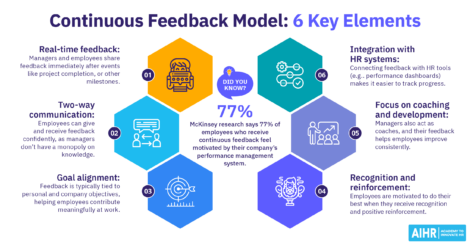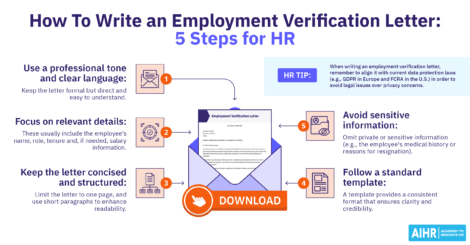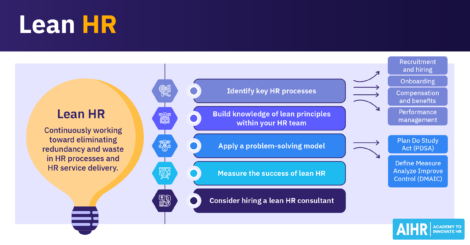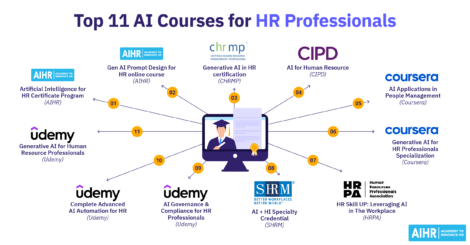The 360 Degree Review Process Explained in 6 Steps

There are several talent development tools and processes available that give input and provide valuable, constructive feedback to employees – including the 360 review process. Feedback is important for all employees, from entry-level to executives. Whether it comes from managers or peers, feedback can provide valuable insight into both an employee’s strengths and areas of opportunity.
Without feedback, employees may be unaware of their strong points or areas that need improvement. Giving and receiving positive and negative feedback is critical in the workplace. According to Forbes, over 85% of all Fortune 500 companies use the 360-degree feedback process as a fundamental part of their overall leadership development plan.
Contents
What are 360 reviews?
The pros and cons of 360 reviews
The 360 review process explained
How HR can implement a 360-degree review process
Tips for facilitating a 360 review process
What are 360 reviews?
A 360 evaluation is an assessment of the various aspects of an individual’s performance, development, and long-term potential. The process includes obtaining confidential, anonymous evaluations from the employee’s direct manager and others with whom they regularly interact, such as peers, co-workers, direct reports, upper management, etc.
Approximately 8-12 individuals typically complete an anonymous online evaluation questionnaire for an employee covering a broad range of workplace-related competencies. The questions are measured on a rating scale, and raters are also asked to provide written comments. The employee being evaluated fills out a similar questionnaire to complete as a self-evaluation.
A 360 review is also called a 360 assessment, and the feedback is often referred to as 360-degree feedback.
It’s important to clarify that 360-degree review assessments are not performance reviews. They are not designed to replace or be a substitute for an employee’s annual performance review or ongoing one-on-one performance feedback sessions, which include a manager’s feedback about an employee’s performance related to job expectations or job-specific skills.
A 360 assessment is a coaching and developmental tool that provides broader perspectives to help the manager deliver a comprehensive performance review.
The pros and cons of 360 reviews
Pros
1. Comprehensive feedback
The 360-degree review process gathers feedback from individuals at multiple levels and job functions, providing a more comprehensive “360” perspective. It may also help identify positive or negative employee performance patterns.
The 360 review process allows the employee being evaluated to receive constructive feedback from their direct supervisor and other relevant sources.
2. Helps identify strengths and developmental needs
It’s important for employees to understand their strengths, what they’re doing well, and how they positively impact their role and organization. Positive feedback is just as important as negative feedback or constructive criticism. Confidence and morale tend to increase when employees know when they’re performing well and how they can continue building upon their strengths.
On the flip side, 360 feedback can also help provide insight into an employee’s areas of improvement. When developmental needs and gaps are identified, the employee can work towards addressing those gaps with a targeted development plan. Again, a key benefit is that the employee is getting this feedback, both positive and negative, from multiple relevant sources and not just from a direct supervisor.
3. Identifies potential training and skill gaps
360 assessments can help management flag training and skill gaps on an individual, departmental and organizational level. Identifying these gaps allows management to develop targeted training initiatives and related efforts to address them effectively.
Cons
1. Risk of bias
There’s always a risk of bias or personal grudges spilling into the feedback process. Biases may cloud the responses of some participants, whether positive or negative.
2. Emphasis on the negative
Suppose managers focus on the isolated or negative aspects of an employee’s results rather than balancing constructive and positive feedback. In that case, it can undermine the entire process and leave an employee feeling resentment, confusion, and decreased productivity.
Managers should strive to maintain a balanced approach and focus on the broader themes of the results.
3. Lack of clarity and poor delivery
If participants are not clear on why they’re being asked to partake in a 360 assessment or about the value the feedback can provide, their trust in leadership and the overall process may decrease. This could lead to a lack of engagement or follow-through on 360-degree feedback.
HR tip
Test the technology. Since most 360 assessments are completed electronically, it’s always wise to be proactive and ensure everything works as it should. Any discrepancies or delays in the technology or data can undermine trust in the process and results. Run some test assessments and reports before the evaluation is rolled out. Being proactive upfront with the technology and how it works can help avoid unexpected surprises and delays in the process.
The 360 review process explained
The following are some of the key steps in administering and applying the 360 review process. The components of a 360-degree assessment vary from company to company, as it is not a standardized process. Management and HR often partner on the organization and administration of the 360 assessment process.
Step 1. Define the key areas
Communication of the goals and objectives of the 360 assessment is part of the process. This includes obtaining various perspectives on identifying an individual’s strengths, areas of opportunity, and “blind spots.” All of these can help promote more self-awareness and result in performance improvement and development.
Examples of critical categories of a 360 evaluation to be assessed include teamwork, interpersonal skills, alignment with company vision/mission, communication, and leadership ability.
Step 2. Selection of reviewers/raters
Selecting employee(s) who will be evaluated and the raters is a critical step of the 360 evaluation process. There needs to be enough reviewers who engage with the participant/employee to ensure the data received is relevant and comprehensive.
While there typically are anywhere from 8-12 raters, the number may be dependent on the employee’s job and with whom they interact. Raters may include the employee’s supervisor, co-workers, direct reports, colleagues, contract employees, and even external customers. All individuals involved with the assessment process need to be trained on the various aspects of the process and the goals and objectives of the 360 evaluation.
Step 3. Administer the survey
Most 360-degree assessments are now completed electronically, where each reviewer receives a unique login and password. Results are automated and analyzed in a final summary report.
360 assessments can still be done by paper or using a typeform. First, send a survey to the employee(s) being evaluated so they can self-evaluate. Later in the process, it will be valuable for participants to compare their self-evaluation with the evaluations of others.
Next, send the survey to the reviewers and provide ample time for them to complete it, usually one week or more. Reiterate to the reviewers why they are being asked to give feedback and the objective of the assessment.
Step 4. Compile the completed survey reports
Once all the questionnaires have been completed, the data needs to be compiled into comprehensive, detailed, and easy-to-understand reports. This report can be shared with the participant, HR, and other stakeholders as needed.
If the survey was administered electronically, then the reports can be automatically generated from the system. The reports are detailed and provide insights to the participants on each area they excel in and areas of opportunity.
Step 5. Provide feedback
The employee being evaluated is given a copy of their results. Their direct supervisor, HR, or both can facilitate a discussion about the details of the results and discuss the next steps. It’s essential to provide valuable feedback to the participant at this stage. Here are some tips:
- Be specific and concrete: Provide specific examples of behavior or performance to illustrate your points.
- Use a balanced approach: Acknowledge strengths and improvement areas to maintain a balanced perspective.
- Focus on behavior, not personality: Discuss observable behaviors rather than making judgments about the employee’s personality.
- Encourage two-way communication: Create a space for dialogue by encouraging the employee to share their perspective.
Step 6. Develop an action plan
A developmental and action plan is usually developed based on the assessment results. Input to the plan should include both the participant and the immediate supervisor.
Based on the results, identify and prioritize the key areas for improvement. Focus on those that have the most significant impact on performance and align with organizational priorities. Engage in a collaborative discussion with the employee to ensure mutual understanding and ownership of the action plan.
Develop SMART (Specific, Measurable, Achievable, Relevant, and Time-bound) goals for each identified area of improvement. Clearly outline the steps and milestones necessary to achieve these goals. Also, identify the resources and support needed for the employee to meet their goals. This may include training programs, mentorship, coaching, or access to specific tools.
Define a system for monitoring progress toward the goals outlined in the action plan. Schedule regular check-ins to assess progress, make adjustments if necessary, and provide ongoing feedback.
Finally, celebrate achievements. Acknowledge and celebrate the employee’s achievements and progress. Recognition can serve as motivation and reinforcement for continued improvement.
HR tip
Expect the unexpected. Have a backup plan if any parts of the process veer of course. For example, consider having a small “reserve” of additional raters if, for some reason, the original raters are no longer available or able to participate.
How HR can implement a 360-degree review process
- Be proactive and consistent: Begin planning for the review process several months in advance. Assessment implementation can vary by company and business need. Planning can include a project plan with timelines, identification of participants, selection of the survey categories and questions, and drafting of training and communication materials. Be consistent about when 360 assessments are conducted, whether annually, bi-annually, etc. This can be incorporated into an organization’s goals and strategic plan.
- Set clear goals and objectives: Communication of the objectives is crucial to the success of the 360 assessment process. As part of HR’s communication plan, reiterate the purpose and goals of 360 assessments, emphasizing that they are used for developmental purposes and not as performance reviews. Communication can be in written form, presented during a staff meeting, or both.
- Design the process: Design and finalize all aspects of the assessment, including questions, raters, participants, analysis and communication of results, and follow-up action plans.
- Facilitate training for key players: Before initiating the 360 assessments, provide adequate training for anyone chosen to be involved in the process, including participants, raters, and management. This will help ensure consistency in understanding the overall process and how feedback is obtained, analyzed, and communicated. Employees who understand all of this will trust the process.
- Post-review support: Partner with and provide support in the post-review process. HR can assist with results rollout and communication, facilitation of results discussion, and development of action plans.
- Conduct periodic progress check-ins: Assist with any follow-up meetings to review the progress of action items included in action plans.
- Post-critique sessions: After the 360 assessment process is complete, conduct post-critique sessions with key players to discuss what went well, opportunities for improvement, and any suggested changes for future 360 survey rollouts.
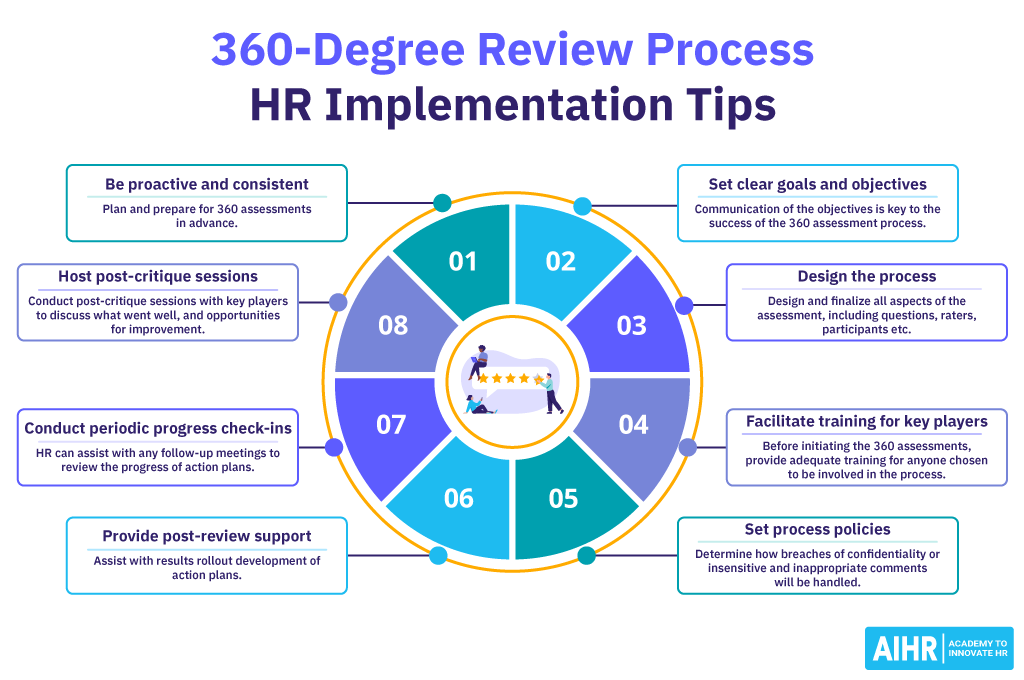
Tips for facilitating a 360 review process
- Stress confidentiality: As part of the communications plan, HR should emphasize that the raters and their responses are kept confidential. This is critical to ensure trust and integrity in the 360 review process.
- Provide management with clear guidelines for communicating results: Decide ahead of time how results will be communicated. For example, will the employee receive the results first, or will the employee’s direct supervisor? Managers need guidelines on how to communicate results to any of their employees who were evaluated. Managers also need guidelines on how to help develop an action plan with their employee(s) and how it differs from creating a performance plan. HR can be present in any feedback meetings, whether to assist management or to help facilitate the meeting.
- Align with the company’s strategy: Measure and report progress or improvements in achieving the company’s overall goals, strategies, and initiatives.
- Cultural considerations: Keep in mind that different cultures may process and perceive 360-degree feedback differently. An approach on how to deliver feedback that is commonplace and “acceptable” in the U.S. culture may not work as well or be considered unacceptable in other countries or cultures.
Final thoughts
Feedback is powerful, especially when it feels authentic, relevant, and part of a trustworthy process. The 360-degree review process provides a holistic approach and offers a well-rounded perspective so employees gain a deeper insight into perceived strengths and weaknesses. This will help build more self-awareness and even help build better relationships with a team.
Being clear and purposeful from the beginning of a 360-degree feedback program will help cultivate an open, supportive, and trusting environment – all of which are critical in this process. A well-defined process will allow for the information gathered to be used to develop the employees and the organization as a whole, which ultimately can positively impact the entire organization.
Learn more
Related articles
Are you ready for the future of HR?
Learn modern and relevant HR skills, online







